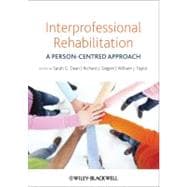
Note: Supplemental materials are not guaranteed with Rental or Used book purchases.
Purchase Benefits
What is included with this book?
About the Editors
Sarah G Dean is a senior lecturer in health services research, based at the University of Exeter, UK, with a background in physiotherapy and health psychology. She has a particular interest in the psychology of exercise-based rehabilitation for people with long term conditions.
Richard J Siegert has a background in clinical psychology and neuropsychology and a special interest in the application of psychometrics to measurement in rehabilitation settings. A Reader in Rehabilitation at King’s College London, he is soon to take up a Chair in Psychology and Rehabilitation at AUT University in Auckland, New Zealand.
William J Taylor is an academic rehabilitation physician and rheumatologist in Wellington, New Zealand, where he teaches a postgraduate interdisciplinary course in rehabilitation and continues to work at the coal-face of clinical practice.
About the editors ix
About the contributors xi
Foreword by Professor Gerold Stucki xv
Preface xvii
Acknowledgements xix
1 Introduction 1
Richard J. Siegert, William J. Taylor and Sarah G. Dean
1.1 What is rehabilitation? 1
1.2 Setting boundaries – or what we don’t mean by rehabilitation 2
1.3 Some defi nitions of rehabilitation 3
1.4 Some other issues in defi ning rehabilitation 4
1.5 The core themes 6
1.6 A word about terminology 7
1.7 Summary 7
2 A rehabilitation framework: the International Classification of Functioning, Disability and Health 9
William J. Taylor and Szilvia Geyh
2.1 There is a need for a common language of functioning 9
2.2 The ICF is both a model and a classification system 12
2.3 The origins of the ICF 17
2.4 Using the ICF in practice – ICF core sets, rehabilitation cycle and ICF tools 19
2.5 Can the ICF be used to measure functioning – both the ‘what’ and the ‘how’? Controversies – to measure or to classify that is the question 30
2.6 Controversies – classifi cation of ‘participation restrictions’ versus ‘activity limitations’ 31
2.7 Controversies – is the ICF a framework for understanding ‘QoL’? 34
2.8 Future developments of the ICF 36
3 An interprofessional approach to rehabilitation 45
Sarah G. Dean and Claire Ballinger
3.1 Introduction and setting the scene 45
3.2 Terminology and interprofessional working within rehabilitation 46
3.3 Characteristics of good teamwork 51
3.4 Team membership and roles 61
3.5 Processes of teamwork 65
3.6 The role of interprofessional education in rehabilitation 69
3.7 Collaborative rehabilitation research 72
3.8 The future for interprofessional rehabilitation teams 73
3.9 Conclusion 74
4 Processes in rehabilitation 79
William Levack and Sarah G. Dean
4.1 Introduction 79
4.2 Assessment 80
4.3 Goal planning 84
4.4 Interventions 97
4.5 Evaluation 102
4.6 Discharge planning and transitions from hospital to community 103
4.7 Conclusion 103
5 Outcome measurement in rehabilitation 109
Richard J. Siegert and Jo Adams
5.1 Introduction 109
5.2 Psychometrics – a primer 118
5.3 Applying outcome measures in clinical practice 125
5.4 Conclusion 128
6 The person in context 135
Julie Pryor and Sarah G. Dean
6.1 Introduction 135
6.2 Who are the stakeholders in rehabilitation? 136
6.3 Key terms 137
6.4 The lived experience of acquired disability 140
6.5 Rehabilitation as a personal journey of reconstruction or transformation of the self 141
6.6 Understanding rehabilitation as ‘work’ and the role of participation 146
6.7 Clinical services guiding and supporting personal rehabilitation journeys 148
6.8 Placing the person in their family context and involving families in rehabilitation 152
6.9 Ideas for making clinical rehabilitation processes and practices person-centred 154
6.10 Can we do person-centred rehabilitation? 159
7 Conclusion: rethinking rehabilitation 167
Sarah G. Dean, Richard J. Siegert and William J. Taylor
7.1 Introduction 167
7.2 The ICF as a theoretical framework and language for rehabilitation 167
7.3 Interprofessional teamwork in rehabilitation 168
7.4 Processes in rehabilitation: goal setting and its mediators 168
7.5 Outcome measurement to evaluate rehabilitation and show it makes a difference 169
7.6 The importance of the individual person in their context and how to do person-centred rehabilitation 169
7.7 Using the ICF as a way to map interprofessional rehabilitation 170
7.8 Revisiting the defi nition of rehabilitation 176
7.9 Limitations related to the scope of this textbook 178
7.10 Future directions of interprofessional rehabilitation 179
7.11 Conclusion 183
Index 185
The New copy of this book will include any supplemental materials advertised. Please check the title of the book to determine if it should include any access cards, study guides, lab manuals, CDs, etc.
The Used, Rental and eBook copies of this book are not guaranteed to include any supplemental materials. Typically, only the book itself is included. This is true even if the title states it includes any access cards, study guides, lab manuals, CDs, etc.